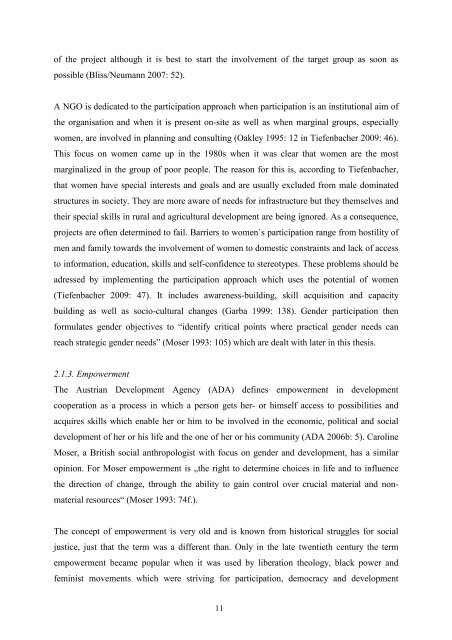DIPLOMARBEIT - ÖH Uni Wien - Universität Wien
DIPLOMARBEIT - ÖH Uni Wien - Universität Wien
DIPLOMARBEIT - ÖH Uni Wien - Universität Wien
Create successful ePaper yourself
Turn your PDF publications into a flip-book with our unique Google optimized e-Paper software.
of the project although it is best to start the involvement of the target group as soon aspossible (Bliss/Neumann 2007: 52).A NGO is dedicated to the participation approach when participation is an institutional aim ofthe organisation and when it is present on-site as well as when marginal groups, especiallywomen, are involved in planning and consulting (Oakley 1995: 12 in Tiefenbacher 2009: 46).This focus on women came up in the 1980s when it was clear that women are the mostmarginalized in the group of poor people. The reason for this is, according to Tiefenbacher,that women have special interests and goals and are usually excluded from male dominatedstructures in society. They are more aware of needs for infrastructure but they themselves andtheir special skills in rural and agricultural development are being ignored. As a consequence,projects are often determined to fail. Barriers to women`s participation range from hostility ofmen and family towards the involvement of women to domestic constraints and lack of accessto information, education, skills and self-confidence to stereotypes. These problems should beadressed by implementing the participation approach which uses the potential of women(Tiefenbacher 2009: 47). It includes awareness-building, skill acquisition and capacitybuilding as well as socio-cultural changes (Garba 1999: 138). Gender participation thenformulates gender objectives to “identify critical points where practical gender needs canreach strategic gender needs” (Moser 1993: 105) which are dealt with later in this thesis.2.1.3. EmpowermentThe Austrian Development Agency (ADA) defines empowerment in developmentcooperation as a process in which a person gets her- or himself access to possibilities andacquires skills which enable her or him to be involved in the economic, political and socialdevelopment of her or his life and the one of her or his community (ADA 2006b: 5). CarolineMoser, a British social anthropologist with focus on gender and development, has a similaropinion. For Moser empowerment is „the right to determine choices in life and to influencethe direction of change, through the ability to gain control over crucial material and nonmaterialresources“ (Moser 1993: 74f.).The concept of empowerment is very old and is known from historical struggles for socialjustice, just that the term was a different than. Only in the late twentieth century the termempowerment became popular when it was used by liberation theology, black power andfeminist movements which were striving for participation, democracy and development11


